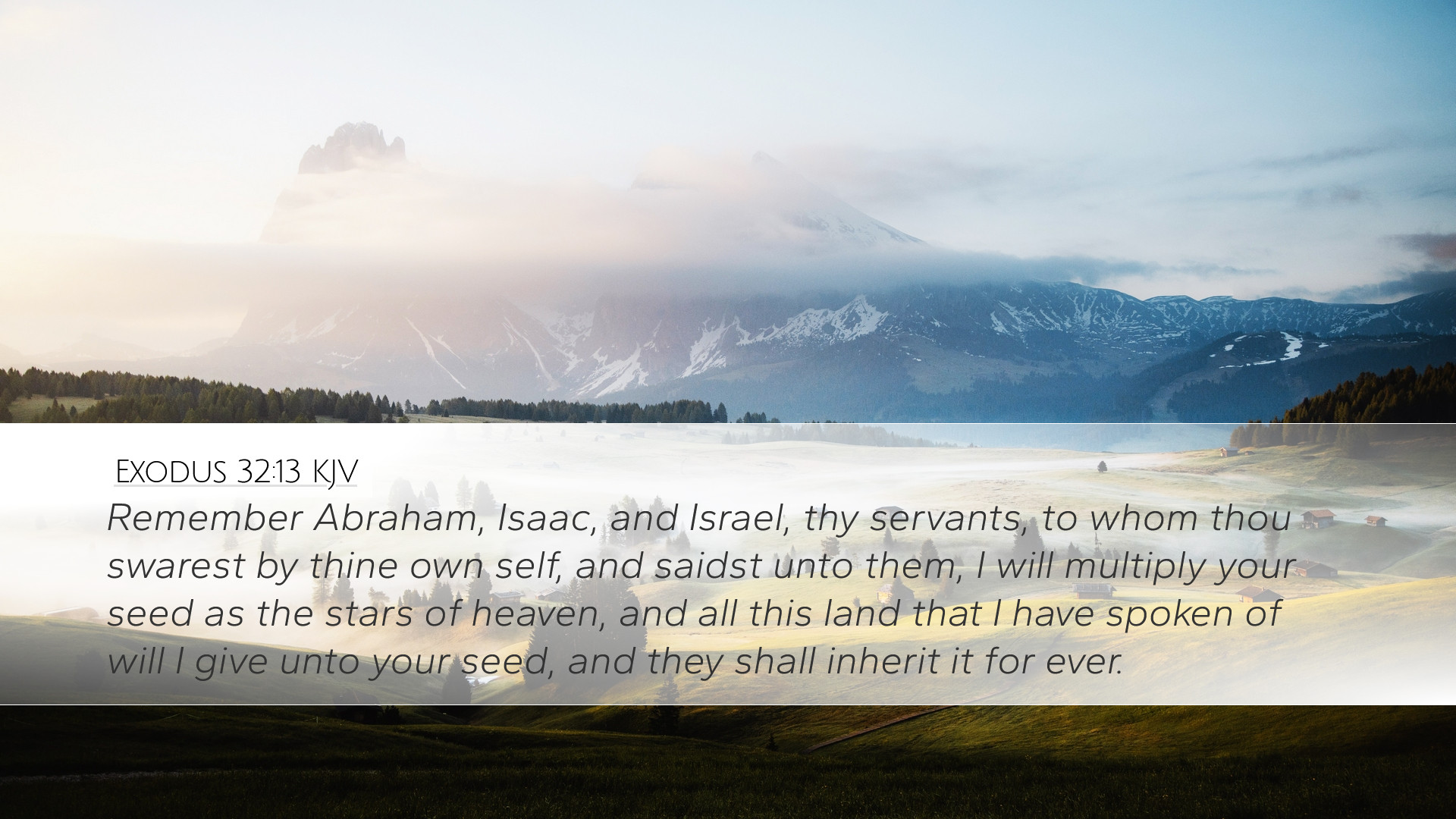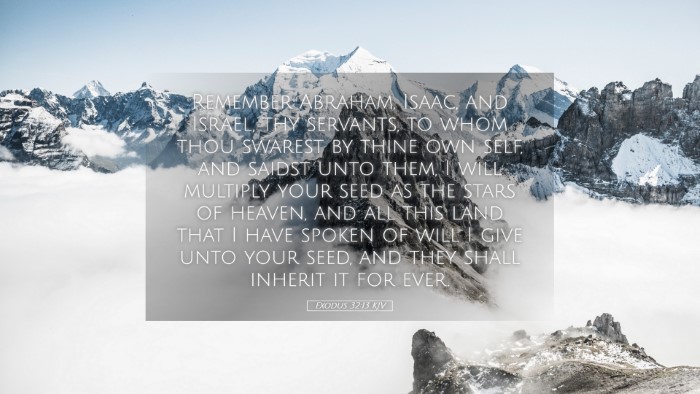Commentary on Exodus 32:13
Verse: “Remember Abraham, Isaac, and Israel, your servants, to whom you swore by your own self, and said to them, ‘I will multiply your descendants as the stars of heaven, and all this land that I have promised I will give to your descendants, and they shall inherit it forever.’” (Exodus 32:13, NKJV)
Introduction
The passage of Exodus 32:13 comes at a pivotal moment in Israelite history, where Moses intercedes for the people after their sin of idolatry. This verse is rich in theological significance and encapsulates themes of divine promise, covenant, intercession, and the enduring nature of God's faithfulness.
Covenant Promises
This verse highlights God’s covenant with the patriarchs—Abraham, Isaac, and Jacob (Israel). The reference to these foundational figures underscores the importance of covenantal faithfulness in the narrative of the Exodus.
- Abrahamic Covenant: God's promise to Abraham included the assurance of numerous descendants and the land of Canaan as their inheritance, emphasizing His unchanging nature.
- Isaac's Role: The inclusion of Isaac reinforces the continuity of God's plan through generations, illustrating that God's promises are not limited to a single individual but extend to their descendants.
- Covenantal Fulfillment: The mention of Israel invokes God's commitment to fulfill His promises through Jacob, the father of the twelve tribes of Israel, serving as a reminder of God's unbreakable covenant.
Intercession of Moses
Moses's appeal to God's promises indicates a deep understanding of the relationship between human agency and divine sovereignty. In this act of intercession, Moses is not merely reminding God of His promises, but invoking God's own words as a basis for mercy and forgiveness.
- Moses as Mediator: This moment foreshadows the role of Moses as a mediator between God and His people, a theme that resonates through the entirety of the Torah.
- The Power of Remembrance: Moses employs the act of remembrance as a theological strategy, highlighting the significance of recalling God’s faithfulness in times of crisis.
Theological Reflections
This scripture invites a deeper exploration of several theological themes:
- Divine Justice and Mercy: The tension between God's justice in response to sin and His mercy towards repentance is prominently displayed.
- The Role of Memory: The act of remembering—both God's promises and His character—serves as a vital element in the spiritual life of believers. It directs them to rely on the past faithfulness of God in their present circumstances.
- Hope in Covenant: This passage reassures believers of the enduring hope found in God's unwavering promises, a recurring theme in the wider biblical narrative.
Historical Context
Understanding the historical backdrop of Exodus 32 enriches the interpretation of this verse. After witnessing the Exodus, the giving of the Law, and the miraculous provision in the wilderness, the Israelites’ turn to idolatry represents a catastrophic breach of faith.
- Idolatry and Its Consequences: The context of Israel’s rebellion prompts a discussion on idolatry's dangers and the implications for the covenant community.
- God’s Response: Throughout history, God's immediate response to human sin is often tempered by His willingness to listen to intercession, as illustrated here through Moses.
Application for Pastors and Theologians
Exodus 32:13 serves as a practical exhortation for those in pastoral roles, theological study, and lay ministry:
- Encouragement in Intercession: Pastors are reminded of the power of prayerful intercession, not merely as a ritual but as a tangible expression of trust in God’s promise.
- The Importance of Teaching Covenant Theology: This verse emphasizes the need to teach congregations about God's covenantal faithfulness and the historical narrative of scripture that supports it.
- Pastoral Care in Times of Crisis: When congregational issues arise, such as moral failures or crises of faith, leaders are called to guide their membership towards remembrance and reliance on God's promises.
Conclusion
Exodus 32:13 serves as a profound reminder of God’s faithfulness and the critical importance of intercession. In this moment, we witness the relational dynamics between God, His servant Moses, and the people of Israel. For students and scholars, this verse embodies the intersection of covenant theology and practical moral living, offering both historical insights and contemporary applications that remain relevant for the church today.


